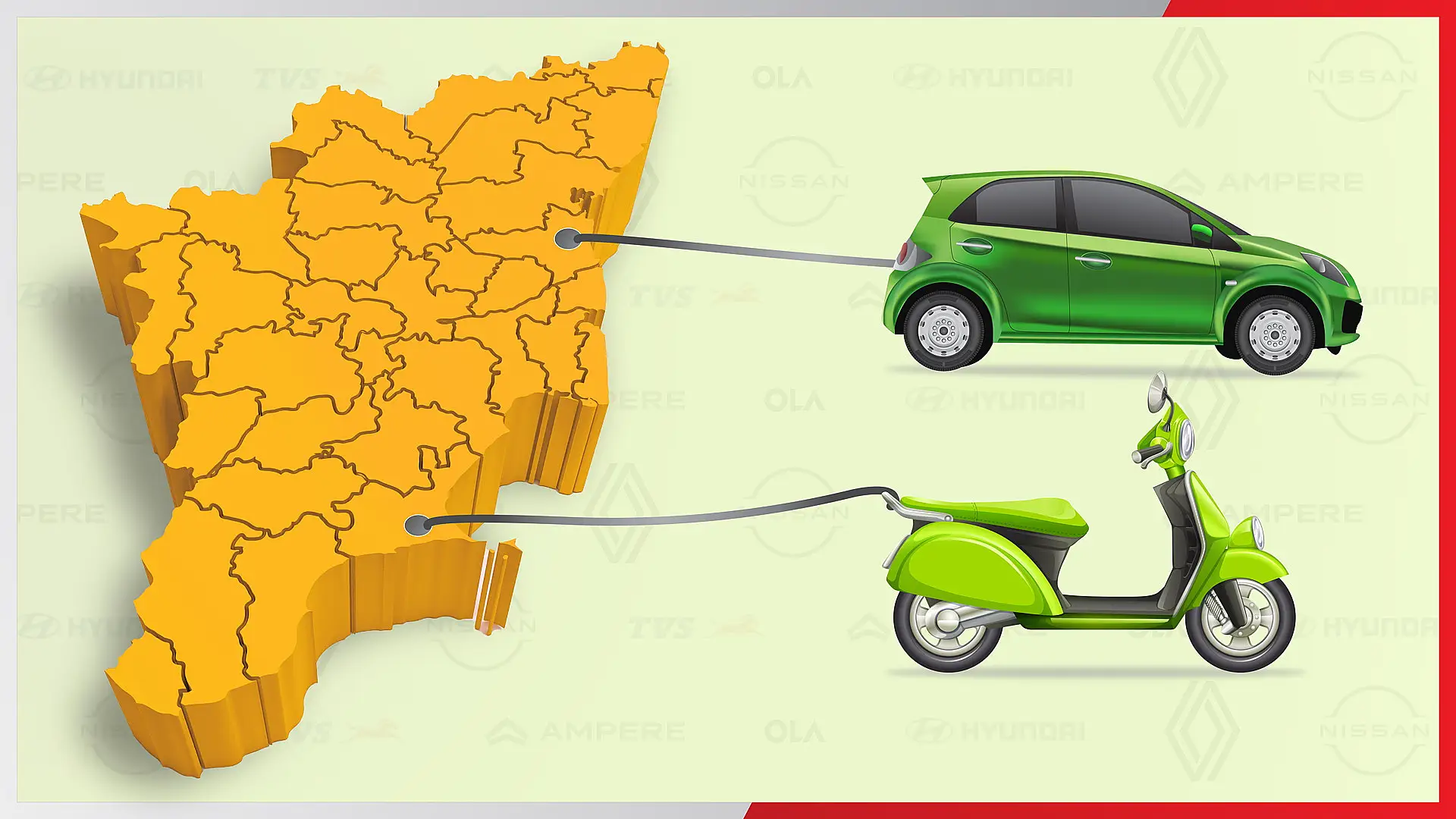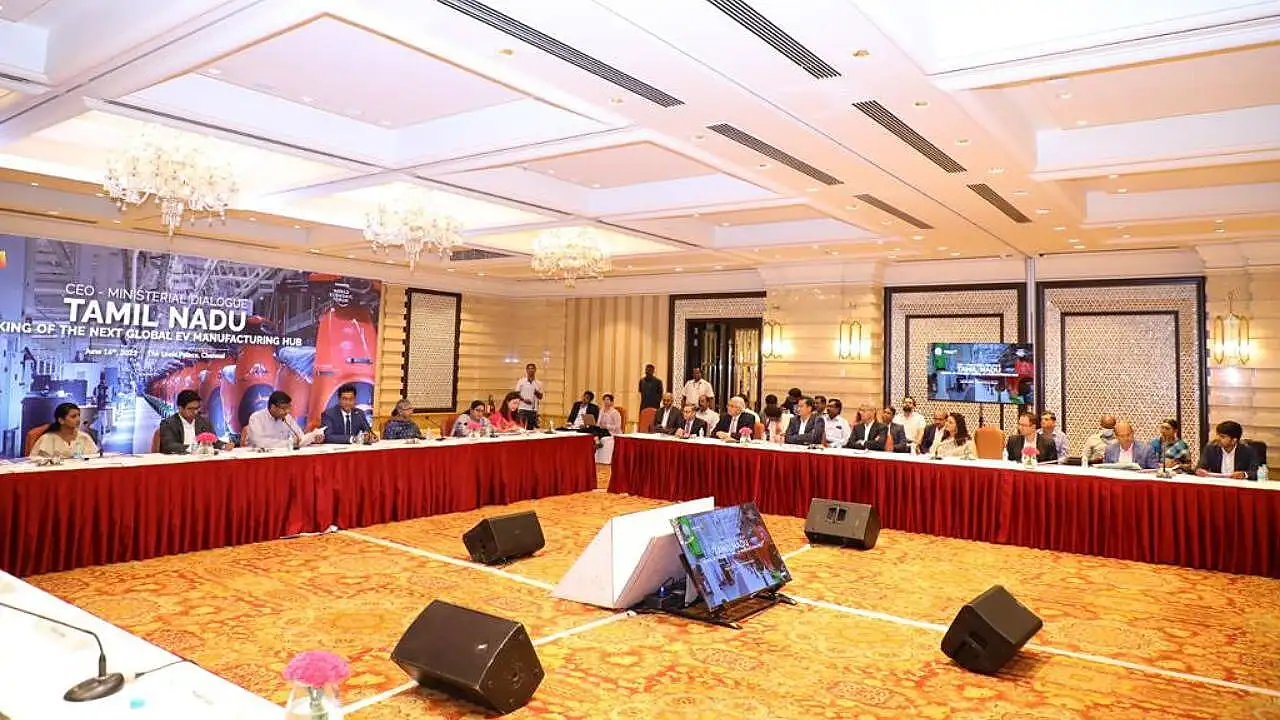
Tamil Nadu aims to create 10,000 startups by 2026 as part of its efforts to stand tall in the Indian electric vehicle arena.
In the process, it could emerge as one of the top three states, up from the present position of 11, in the Startup India State rankings. This will place it in the leaders' category along with Assam, Punjab, Uttarakhand and Uttar Pradesh.
Vishnu Venugopalan, MD & CEO, Guidance Tamil Nadu, told Mobility Outlook that the State has over 6,000 recognised startups across 30 sectors, including automotive, and is now creating a comprehensive roadmap to take the story to the next level. Chennai recently hosted a roundtable discussion on ‘Tamil Nadu: Making of the Next Global EV Manufacturing Hub,’ organised by the State Government and the World Economic Forum.
Chaired by Dr T R B Rajaa, Minister for Industries, Investment Promotion, and Commerce, it had representatives from industry and academia offering perspectives and strategies. The goal was to position the State as a global leader in EV manufacturing, which included a focus on supply chain, infrastructure, skill development, ecosystem, circularity, regulatory and subsidies & incentives.
Venugopalan said Tamil Nadu would invest in facilities for testing and homologation while ensuring interoperable charging infrastructure. As for growing the talent pool, it would collaborate with State/local universities for skilling programmes.
Engineering graduates would be encouraged to work in e-mobility, including EVs and hydrogen mobility, and develop specialised skill sets in areas like lithium handling.
To make EVs commercially viable, the State plans to electrify part of its public transport fleet, including taxis and buses, by nurturing local players. It plans to go beyond incentives and create demand by raising awareness and improving charging infrastructure while including EVs in the list of priority-sector lending.
Benefits For MSMEs
Venugopalan said these initiatives would help MSMEs which play a vital role in the automotive value chain. They make key parts like wiring harnesses, steering and suspension systems, transmission components and engine parts.
With India’s EV industry set to grow at 49% CAGR till 2030, MSMEs in Tamil Nadu will benefit since EVs and conventional vehicles share components like steering, suspension, seating and braking systems. According to Venugopalan, the EV industry needs specific components, such as motors, controllers, DC-DC converters and battery packs. These can be produced at scale by MSME companies located in clusters such as Chennai, Coimbatore and Hosur, which already are home to large electronics clusters.

Four of the five largest electric two-wheeler makers in the State have ambitious growth plans, while carmakers such as Hyundai and Renault-Nissan are also gearing up to launch EVs. Gopalakrishnan CS, Chief Manufacturing Officer, Hyundai Motor India, said the company wants to be a strategic partner to the TN Government's vision of creating a sustainable ecosystem to transition to electric mobility.
“Our recent commitment of INR 20,000 crore to develop a sustainable EV ecosystem is testament to Hyundai’s commitment to boosting socioeconomic development in the State. Hyundai will accelerate the transition towards carbon-neutral manufacturing for both ICE and EVs. A battery pack assembly unit will be set up at our factory with 100 charging stations installed across the State over the next ten years,” he elaborated.
Venkatram Mamillapalle, Country CEO & Managing Director, Renault India Operations, said the roundtable marked a pivotal moment for the automotive industry and Renault's commitment to shaping the future of mobility. Tamil Nadu's “visionary approach, robust infrastructure, skilled workforce, and supportive Government policies” have made it an ideal destination for Renault India and other companies to establish themselves as key players in the global electric vehicle manufacturing landscape.
“Our recent alliance announcement with Nissan, committing a substantial investment of INR 5,300 crore in TN, along with the plan to manufacture six new models at our Chennai plant, marks a significant moment for the automotive industry,” added Mamillapalle.
Supply Chain
Venugopalan said the State would establish a robust supply chain for mechatronics, electronics, and software. It would also address the underdeveloped supply chain for electronic components, especially electric motors and controllers, to overcome dependency on China. The goal was to facilitate the startup ecosystem in fostering innovation.
Renault’s Mamillapalle said the company was keen to accelerate the transition towards cleaner transportation, reduce carbon footprint, and contribute to the nation's climate goals by leveraging Tamil Nadu’s rich ecosystem. “Together with our local partners, suppliers, and stakeholders, we are committed to fostering innovation, nurturing talent, and creating high-quality jobs in Tamil Nadu,” he explained.
Renault will, through collaborative efforts, develop a robust supply chain, encourage research and development, and promote skill development programmes to meet the growing demand for electric vehicles. “We are excited to be part of this transformative journey, and together, we will build a strong foundation for Tamil Nadu to emerge as the next global EV manufacturing hub,” said Mamillapalle.
Recalling the event where Raptee closed its fundraising at the Guidance TN Lounge at Davos Dinesh Arjun, Co-founder & CEO of the start-up said he requested for a clear framework and structure to be defined for the State to invest into start-ups and the Minister assured to support on the same.

Circular Economy
For effective circularity, the State will set up authorised scrapping centres to reuse materials and support companies in extracting black metal from batteries to mitigate battery disposal issues.
From the regulatory point of view, it plans to establish a quick clearance system for permits and clearances to facilitate a faster transition, address the lack of transport department guidelines for the commercial vehicle ecosystem, and reduce high industrial tariffs on charging stations to commercial tariffs. To make it a commercially viable proposition, Tamil Nadu will also help spur demand for e-mobility through customer-centric development of fuels and technologies in addition to offering subsidies to suppliers.
Over the past five years, the State has emerged as a leading EV manufacturing destination, earning it the moniker, ’EV Capital of India.' Interestingly, during the COVID pandemic, Tamil Nadu secured nearly INR 24,000 crore in EV investments, leading to almost 48,000 jobs, Venugopalan said.
Dr T R B Rajaa said at the roundtable that Tamil Nadu aimed to secure $6 billion in investments and create 1.5 lakh employment opportunities within the EV sector over the next five years. As part of this drive, the Government launched the revised ‘Tamil Nadu Electric Vehicles Policy 2023,’ which incentivises and attracts investors to strengthen the State's EV ecosystem.
Chennai, Coimbatore, Tiruchirappalli, Madurai, Salem, and Tirunelveli have been earmarked for development as EV hubs. Venugopalan was hopeful that these initiatives would help Tamil Nadu achieve its goals.
Also Read:
Hyundai To Invest INR 20k Crore In Tamil Nadu Over Next Ten Years